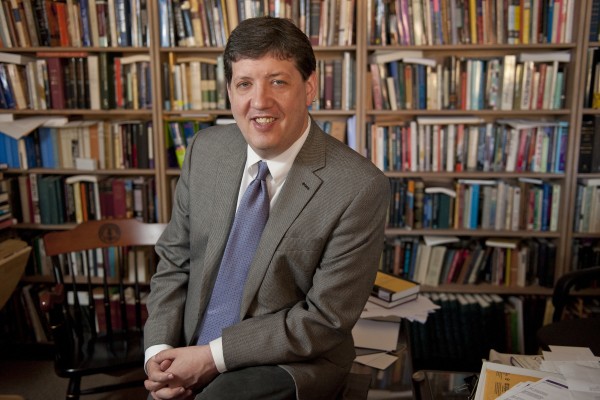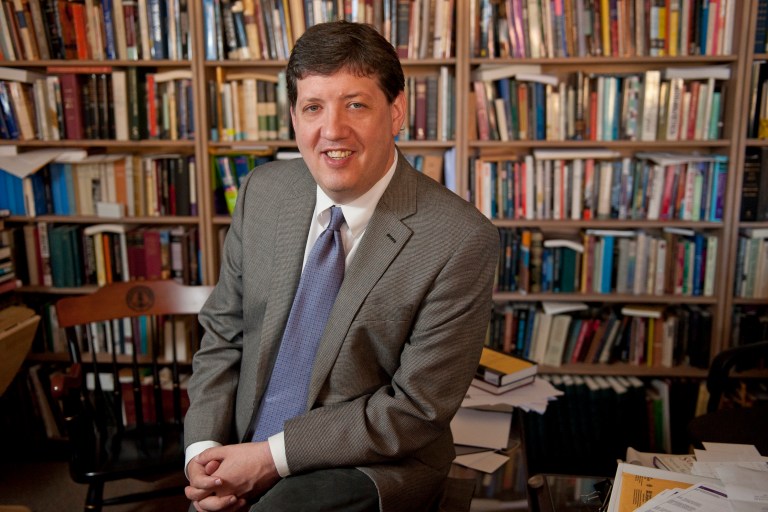Steven Weitzman is a professor of Jewish Culture and Religion in the Department of Religious Studies and the director of the Taube Center for Jewish Studies. Weitzman came to Stanford from Indiana University five years ago and currently serves as the resident fellow in Roble Hall, accompanied by his wife — an ordained rabbi — and his four children. The Daily spoke with Professor Weitzman about his work on campus and his own thoughts about religion.
The Stanford Daily (TSD): How did you end up as a Resident Fellow (RF)?

Steven Weitzman (SW):In my previous position, I taught a lot of undergraduates and I really valued that experience. In the humanities right now, there are not that many students in it, and I missed the context of undergraduates. I found out about the RF option and I thought it was a great way to develop relationships with undergraduates. I also realized that it would be a great way for my kids to grow up.
I have four children and they’re different ages [15, 12, 7 and 7], and it’s been a different experience for the four of them. For all of them, though, it’s been enormously stimulating. They’ve learned about what college life is like, both the good and the bad, and they’ve had a lot of interpersonal and cultural experiences. The older ones are shy, but even if they don’t want to talk to the students, they still learn a lot from watching them in the dorm.
TSD: How do you try to bring religious programming to the students on campus?
SW: In the religious studies department, I’m affiliated with the Center for Comparative Studies of Race and Ethnicity (CCSRE). CCSRE is about ethnicity and the religious department is about religion, and I recognized that for a lot of people in the world, those two things are both part of their identity. I was looking for ways to develop connections and build bridges between those two areas. We conceived of this initiative, The Stanford Project for Religious and Ethnic Coexistence. It supports programs on campus that explore religious and ethnic conflict and coexistence. There’s a component to the initiative that takes place in the residences.
Last year was the first year of the initiative and we had programs that were largely initiated by other RFs and sometimes by students, in a range of areas, such as a film showing and discussion about evangelical music, a Syrian hip-hop concert, and programming on the Israeli-Palestinian conflict.
TSD:What reception has this programming garnered from students on campus?
SW: The people who choose to participate in the programming have found them very meaningful. I think it can be tough for people to talk about religion outside of their own religious community. We encountered some difficulty in generating programs that were meaningful for people because people don’t really know how to talk about religion outside of their own. I think this is the role of religious studies, to help people understand religion, not to attack religion or promote religion but to understand it. I think there’s a role for that on campus because people have a hard time talking about their beliefs or understanding the beliefs of others.
One program that was sponsored this year brought a group of students to see “The Book of Mormon,” which is a very funny play but is also very critical of religion, and I think it made some students who are religious very uncomfortable, which was a shame. A lot of times people feel like you are either attacking or supporting religion, but there’s also a lot of room for understanding religion.
TSD: What type of dynamic have you seen between students who are religious and students who are not?
SW: We haven’t measured anything like that in any formal way, but the students that I’ve interacted with have appreciated the chance to talk about these things. Sometimes I don’t know even know how to start a conversation with someone about religion, and so having options and programming that can help people get into the kinds of conversations they wouldn’t know how to start otherwise can be really rewarding.
TSD: In what other ways have you tried to incorporate religion into your time at Stanford, outside of this initiative?
SW: I’m a scholar of religion, so my courses are about religion. I’m not a promoter of religion, and I don’t see myself as a religious person. I take religion seriously and I identify as Jewish, but I don’t have any religious motivations that I am aware of. I do find value in helping people understand religion, especially religions that are different from their own.
I function as an advisor for a student-initiated course called Interfaith at Noon, which will be offered again in the spring for the third year. It meets once a week over lunch, with a theme that functions as the focus of a quarter-long discussion that brings in guest speakers and involves the students in a discussion amongst themselves. The first year, the theme was religion and the stranger, so what religion teaches about one’s responsibility to strangers, to others, to the marginalized. Much of the focus was on religion and immigration policy. The second year was on religion and the ethics of wealth, and the third is likely to be on religion and politics.
TSD: How do you view Stanford’s relationship with religion?
SW: I teach a course every other year in the fall called Is Stanford a Religion? This course works to understand Stanford and its culture and the rituals of Stanford undergraduate life, so looking at things like Full Moon on the Quad. One of the topics of the course is Stanford’s own history and its relationship with religion.
From the very beginning, Stanford was committed to being non-denominational and not identified with a specific religion, which distinguished it from other universities like Harvard and Princeton, which identified with a specific denomination. That set a precedent for Stanford being a diverse place, open to multiple points of view. But I think that also means that now, a lot of faculty and students don’t identify as religious or some don’t take it seriously. Even today, I think some students find it hard to be out in the open about their religious identity.
This interview has been condensed and edited.
Contact Josee Smith at jsmith11 ‘at’ stanford.edu.
